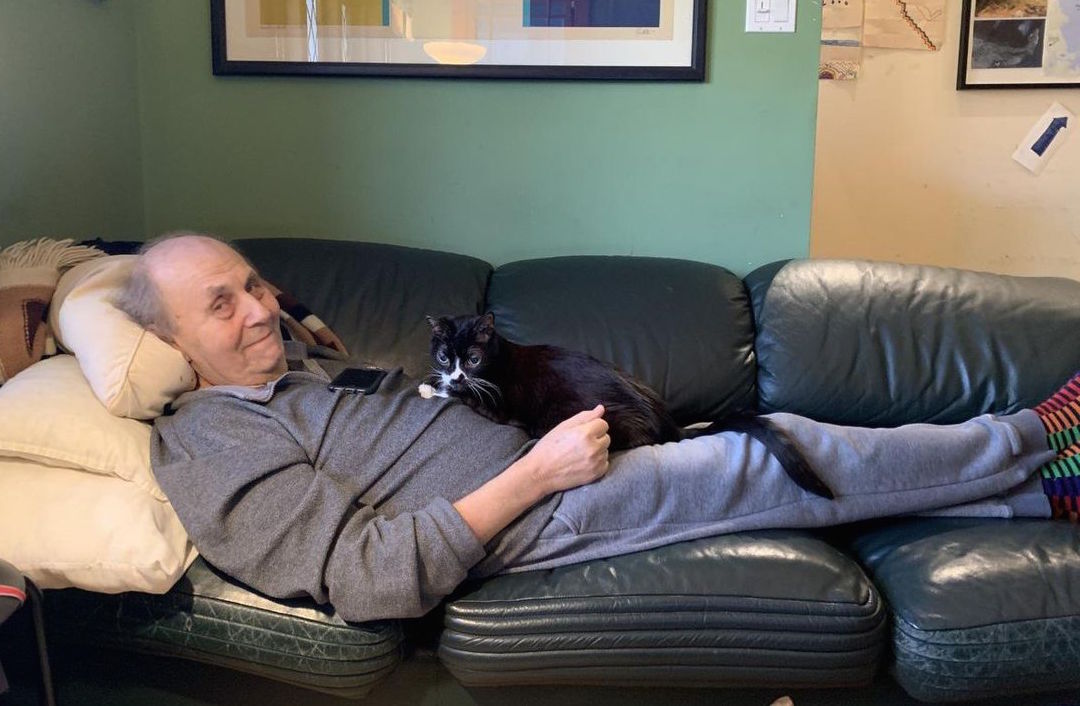There are too many stories now about lives being cut short, or ending in undeserved loneliness, but this isn’t one.
Our cat Keiko died Tuesday, at the good old (or old enough) cat age of 16. He was euthanized by his lifelong vet, Dr. Edison Barrientos, who knew him longer than we did. Keiko was brought in for a physical from the lanes of Toronto by Annex Cat Rescue, as runt of the litter. He and my son Gideon — who was six and also small back then — bonded during the process of meeting fostered-out kittens. I called Dr. Barrientos for medical info.
He said he recalled this little guy. Keiko was sickly and maybe it’d be best to go for a healthier choice, since he mightn’t make it. I made a half-assed try at that, but decided I’d rather deal with a dead pet than push my kid against his clear impulses. Then? A pretty healthy life with the same vet for many years.
Four years ago, the complications got more complicated and the doc said we should prepare ourselves. He outlined the options. But he didn’t give up on Keiko and the cat came back, as they often do. Nine lives has always been a gross underguesstimate. Four months ago, another crash, days in the clinic moping and not eating. Others thought Keiko was done, but our doc said he knew this guy and he could beat it. He did, after coming home, though now we knew we were on borrowed time — making it especially precious.
I went through that with a terminally ill friend recently: treasuring the time we had, knowing it’d end. Four weeks ago came another crash, which really seemed the end, but Keiko bounced back. This week, after a pleasant weekend, it was finally done. The doc came by after office hours, gave him the shot, we chatted and that was it: like a small black-and-white wool sock on the floor.
It was exactly how assisted dying should work. You know you’ve had all the care available and eked out all the time possible. You may’ve endured discomfort, but not deep suffering. Before that, you got some last good moments and ended while feeling yourself, walking about, settling in your favourite spots and hanging out with your familiars.
Then you’re assisted into sleep and finally the end. (For Keiko, it’s not even that stark; I’m pretty sure the idea of death didn’t beset him.) Deep sigh, mourning, sadness — but nothing to regret. It’s the package we were given.
Sadly, this isn’t what many in our world-leading (for COVID death rates) long-term care homes received. They didn’t get the best care and longest lives possible, and often died among (frequently compassionate) strangers. They were scrimped on by cheapskate governments. Shame on them — and us.
It’s also made me think about “evidence-based” medicine, a noble advance from your doctor’s hunches or long-ago med school courses. But it has limits, since the evidence might not include your own unique patterns which only a longtime GP (or vet) may know. Had it been up to another vet, relying mainly on the “evidence,” Keiko could’ve been gone earlier than necessary.
It does feel odd writing about mourning a cat in this time when people who die don’t get the space they deserve and which their mourners need — while a cat garners levels of attention that many humans don’t.
I of course am still not used to him being gone. I look up as I write, as if I’ll see him pad by, or looking over at me. I talk aloud to myself, as seemed normal, yet which I now realize was because I knew he was around to hear. I’m already reverting to just thinking my thoughts, versus voicing them.
John Donne wrote nearly 400 years ago that “if a clod be washed away by the sea, Europe is the less, as well as if a promontory were.” He was enlarging the arena of identification for the living who remain. For those connected to animals, their death undoubtedly diminishes us. Anyone or anything that enhances our sense of the preciousness of being here, whatever/wherever this is, deserves mourning. COVID shouldn’t reduce that sense, but enhance it.
Rick Salutin writes about current affairs and politics. This column was first published in the Toronto Star.
Image credit: Rick Salutin



